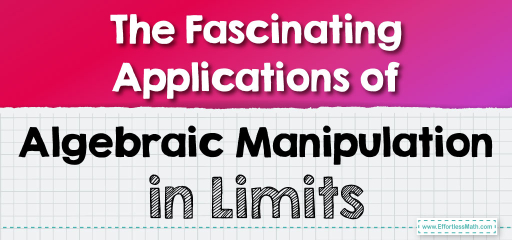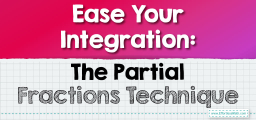The Fascinating Applications of Algebraic Manipulation in Limits
Algebraic manipulation is a fundamental skill in mathematics, involving the process of rearranging, simplifying, or transforming mathematical expressions and equations using algebraic rules and operations. It's a key tool in solving equations, simplifying expressions, and in many other aspects of mathematics, including calculus.

Algebraic manipulation is a core skill in mathematics, essential for effectively solving problems, simplifying expressions, and understanding mathematical concepts. Mastery of algebraic manipulation techniques forms the foundation for success in various areas of mathematics, including calculus, geometry, and trigonometry, and is indispensable in scientific and engineering fields. Let’s delve into this concept thoroughly:
Definition and Purpose
- Definition: Algebraic manipulation refers to the techniques used to reconfigure or simplify algebraic expressions or equations. This can include expanding, factoring, simplifying, or solving them.
- Purpose: The main goal is to simplify complex expressions, solve equations, or transform an expression into a more useful form.
Key Techniques in Algebraic Manipulation
Expanding and Simplifying:
- Expanding: Involves using distributive laws to open brackets, like expanding \( (a + b)(c + d) \) into \( ac + ad + bc + bd \).
- Simplifying: Reducing expressions to their simplest form, often by combining like terms.
Factoring:
- Breaking down complex expressions into products of simpler factors. For example, factoring \( x^2 – 9 \) into \( (x + 3)(x – 3) \).
Solving Equations:
- Rearranging and simplifying equations to find the value of unknowns. This includes techniques like isolating variables, using inverse operations, and balancing equations.
Using Formulas and Identities:
- Applying known algebraic formulas and identities to simplify or solve expressions. For example, using the quadratic formula to solve quadratic equations.
Fraction Operations:
- Includes simplifying, adding, subtracting, multiplying, and dividing fractions, often requiring a common denominator for addition and subtraction.
Rationalizing:
- Particularly in dealing with radicals or complex fractions, rationalizing involves removing the radical from the denominator or simplifying complex fractions.
Applications in Mathematics
- Solving Problems: Algebraic manipulation is fundamental in solving a wide range of mathematical problems, from basic algebra to advanced calculus.
- Calculus: In calculus, algebraic manipulation is used to simplify functions for differentiation or integration and to solve limit problems.
- Algebraic Equations: It’s crucial for solving linear, quadratic, and higher-order polynomial equations.
- Geometry and Trigonometry: Used to rearrange formulas and solve for specific variables in geometric and trigonometric problems.
FAQ
What is algebraic manipulation?
Algebraic manipulation is the process of rearranging, simplifying, or transforming algebraic expressions and equations using algebraic rules and operations. It includes techniques like expanding, factoring, and solving equations.
Why is algebraic manipulation important in mathematics?
Algebraic manipulation is crucial for solving equations, simplifying expressions, and understanding mathematical relationships. It forms the basis for more advanced topics in mathematics, including calculus, and is essential in various scientific and engineering applications.
What are some common techniques used in algebraic manipulation?
Common techniques include expanding expressions, factoring polynomials, simplifying fractions, rationalizing denominators, and isolating variables to solve equations.
Can algebraic manipulation be used to solve all types of equations?
While it’s a versatile tool, some complex equations, especially non-algebraic ones, may require additional or alternative methods beyond basic algebraic manipulation.
How is algebraic manipulation used in calculus?
In calculus, algebraic manipulation is used to simplify functions for differentiation and integration and to solve limit problems. It’s essential for understanding and working with the functions and formulas in calculus.
Are there any specific formulas I should know for effective algebraic manipulation?
Yes, being familiar with basic algebraic formulas, like the quadratic formula, and identities, such as the Pythagorean theorem in trigonometry, is very helpful.
What is the best way to learn algebraic manipulation?
Practice is key. Working through a variety of problems, starting from simple to more complex ones, and understanding the underlying algebraic principles is the best approach.
How does algebraic manipulation help in problem-solving?
It helps to transform complex problems into simpler forms that are easier to understand and solve. By manipulating equations, you can isolate and solve for unknown variables or simplify complex expressions.
Is algebraic manipulation only used in pure mathematics?
No, it’s also widely used in applied mathematics, physics, engineering, economics, and various other fields that utilize mathematical models and problem-solving.
Can algebraic manipulation lead to different forms of the same solution?
Yes, sometimes algebraic manipulation can result in different but equivalent forms of a solution, demonstrating the flexibility and adaptability of algebraic techniques.
Related to This Article
More math articles
- How to Determine the Classification of a System of Equations?
- ATI TEAS 7 Math Formulas
- How to Calculate the Volume of Cubes and Prisms
- 3rd Grade IAR Math FREE Sample Practice Questions
- How to Find Volume by Spinning: Washer Method
- The Ultimate Algebra 2 Course
- Fundamental Theorem of Calculus: A Principle That Saves Your Life
- Hоw to Gеt a Great Sсоrе оn thе SAT Math Test
- How to Use Partial Products to Multiply Two-Digit Numbers By Two-digit Numbers
- How to Use Elimination to Solve a System of Equations: Word Problems



















What people say about "The Fascinating Applications of Algebraic Manipulation in Limits - Effortless Math: We Help Students Learn to LOVE Mathematics"?
No one replied yet.